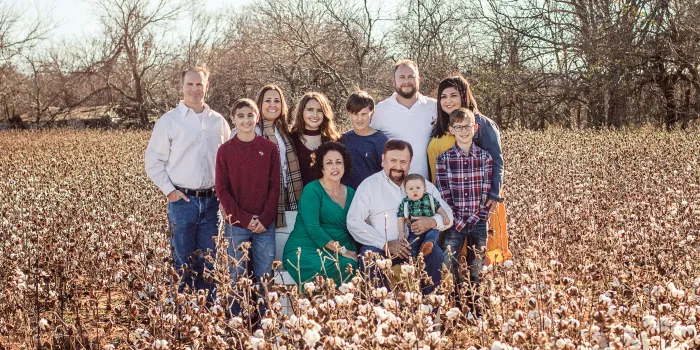When members of Sasha Cheatham’s childhood church in Oklahoma learned that her young son had been diagnosed with hemophilia, they wanted to do something to help her family.
“It’s the church I grew up in, down the road from where my parents live,” Cheatham says. “It’s a little country church, like those churches with a white steeple you see in postcards.”
Cheatham’s family has had a long relationship with the West Point Christian Church in Yukon. Her great-grandparents helped to construct the church building in 1898, and her family has attended services there for generations. “I got married there, my brother got married there,” says Cheatham, who now lives 45 minutes away in Shawnee, Oklahoma. “It will always hold a special place in my heart.”
When Cheatham’s son, Reece, who is now 14, was diagnosed with hemophilia at 8 months old, her childhood church community heard the news through her parents. When Reece was 2, the church organized a health fair fundraiser to raise awareness about bleeding disorders. The next year, church volunteers tried a different fundraiser, which was even more successful: a yard sale, craft show and raffle, with gift cards from area restaurants and businesses as prizes.
“For over 10 years, they did this annually to support my family, the Oklahoma Hemophilia Foundation and the bleeding disorders community as a whole,” Cheatham says.
Support for a cure
Over a decade, the congregation raised more than $12,000. The funds were sent to the Oklahoma Hemophilia Foundation and then to the National Hemophilia Foundation’s Judith Graham Pool Postdoctoral Research Fellowship, which supports basic science and preclinical research in bleeding disorders. Cheatham helped decide where the funds should go.
“The church wanted to initially help us, but our insurance covered most everything,” Cheatham says. “We wanted a cure—for future generations, but also for Reece. That’s one reason why we chose the Judith Graham Pool fellowship.”
Although Reece’s initial diagnosis changed from moderate to severe hemophilia A with a tolerized inhibitor, he’s doing well. Today, he’s a high school freshman, plays baseball and appreciates what West Point Christian Church has done for the bleeding disorders community.
At the fundraisers, Cheatham educated people about bleeding disorders and the Oklahoma Hemophilia Foundation. “I would always be there if people had questions,” she says. “We had a poster board there explaining what the money was going to go toward.”
She also shared details of the My Life, Our Future (MLOF) genetic testing program, which offered free genotyping for people with hemophilia, genetic carriers and potential carriers from 2013–2017. In 2015, she and her daughter, Skylar, now 17, took part in MLOF. Testing confirmed Cheatham is a carrier. (After Reece’s diagnosis, Cheatham learned that one of her great-uncles had hemophilia.) Skylar is not a carrier.
Cheatham and her family have supported the bleeding disorders community since Reece was a baby, and that commitment continues. “That’s been our focus,” Cheatham says. “Since Reece was diagnosed, we said, ‘We want better products. We want a cure.’ I think that’s what everyone wants.”

